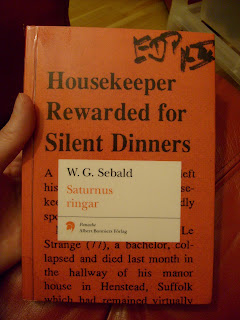Some of the stuff he thinks about: Thomas Browne´s skull (he was a doctor in Norwich 400 years ago), the bombing of German cities, gardens, the lifestyles of kings, the fishing of herring, human demographics, sea battles, war camps, Joseph Conrad´s life, slavery, colonialism, the hunger for power, English excentrics, love, silk worms. And more. It all seems to have nothing to do with anything, but after a while you see that all these things are connected in a number of ways. And isn´t that often how our minds work: we move from one interesting thing to another, but because we make the choices, there will eventually be a red thread there somewhere. I think our questions lead us fairly clearly and surely in the directions we need to go, it might just not always be obvious to us at the time. It is usually easier to see in hindsight.
I suppose that is part of Sebald´s mission, to explore the ways of the mind. Of memory. I have, of course, read some of the reviews and writings about Sebald on the net, and my impression is pretty much everyone´s. I think Sebald might be one for the re-reading-list, I find it a book to rest in, to lounge in, while thinking about thinking. And about writing. What is a story? What is an essay? What is genre? Words and pictures? Does it matter? Shall one discipline one´s thoughts to fit the mould, one of the moulds, or should one just make a mould out of the shape of one´s thoughts?
Sebald is attracted to excentrics. People who, seemingly, have the freedom to choose a life suited to them, who shapes their circumstances to fit them. I imagine that was his dream. He was a German who could not come to term with what had happened in Germany during the war. He made a new life for himself in England, but he struggled, of course, and the books he wrote was part of that. Perhaps that was his ideal: to be able to shape a life that fit him, like he shaped his books.
WG Sebald died young, only 57. He had a heart attack while driving and died in the crash. Luckily, his daughter, who was with him, survived. In one of his last interviews, he showed the journalist Maya Jaggi (for the Guardian), a photograph:
he showed me a sepia photograph of a young boy from his mother's Bavarian clan, who was destined to return mentally disturbed from the first world war. "This is before he knew," Sebald marvelled at the innocent countenance. "I find that frightful - the incapacity to know what's round the corner."


No comments:
Post a Comment